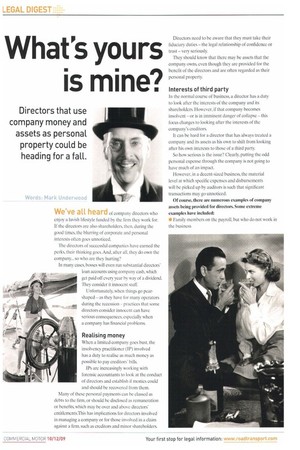What's yours is mine.
Page 28

If you've noticed an error in this article please click here to report it so we can fix it.
Directors that use company money and assets as personal property could be heading for a fall.
We've alt heard of company directors who enjoy a lavish lifestyle funded by the firm they work for. If the directors are also shareholders, then, during the good times, the blurring of corporate and personal interests often goes unnoticed.
The directors of successful companies have earned the perks, their thinking goes. And, after all, they do own the company.. so who are they hurting?
In many cases, bosses will even run substantial directors' loan accounts using company cash, which get paid off every year by way of a dividend. They consider it innocent stuff.
Unfortunately, when things go pearshaped as they have for many operators during the recession practices that some directors consider innocent can have serious consequences. especially when a company has financial problems.
Realising money When a limited company goes bust, the insolvency practitioner (IP) involved has a duty to realise as much money as possible to pay creditors' bills.
IPs are increasingly working with forensic accountants to look at the conduct of directors and establish if monies could and should be recovered from them.
Many of these personal payments can be classed as debts to the firm, or should be disclosed as remuneration or benefits, which may be over and above directors' entitlements.This has implications for directors involved in managing a company or for those involved in a claim against a firm, such as creditors and minor shareholders. Directors need to be aware that they must take their fiduciary duties the legal relationship of confidence or trust very seriously.
They should know that there may be assets that the company owns, even though they are provided for the benefit of the directors and are often regarded as their personal property.
Interests of third party In the normal course of business, a director has a duty to look after the interests of the company and its shareholders. However, if that company becomes insolvent or is in imminent danger of collapse this focus changes to looking after the interests of the company's creditors.
It can be hard for a director that has always treated a company and its assets as his own to shift from looking after his own interests to those of a third party So how serious is the issue? Clearly, putting the odd personal expense through the company is not going to have much of an impact.
However, in a decent-sized business, the material level at which specific expenses and disbursements will be picked up by auditors is such that significant transactions may go unnoticed.
Of course, there are numerous examples of company assets being provided for directors. Some extreme examples have included: • Family members on the payroll. but who do not work in the business








































































































































